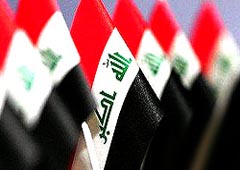Iraq’s prime minister ordered an investigation Monday into the slaying of half of the roughly 100 remaining residents at an Iranian dissident camp north of Baghdad, where a U.N. team got its first look at the aftermath of the large-scale bloodshed.
The promised probe will do little to appease backers of the more than 3,000 exiles left inside Iraq who believe they remain targets in a country whose government wants them gone.
Supporters of the Mujahedeen-e-Khalq members living at Camp Ashraf insist that the Saddam Hussein-era facility came under attack Sunday from Iraqi forces. Iraqi officials have denied involvement, with some suggesting there was an internal dispute at the camp.
Iraqi Prime Minister Nouri al-Maliki’s office said a special committee is being set up to investigate what happened at the camp, located about 95 kilometers (60 miles) northeast of the Iraqi capital.
In a statement, it said the Iraqi government is committed to ensuring the safety of people living within its borders. But the terse remarks also made clear Baghdad’s impatience with resolving the MEK issue, stressing "the necessity of transferring the MEK members who are staying in Iraq illegally."
The MEK opposes Iran’s clerical regime and until last year was labeled a terrorist group by the United States. It carried out a series of bombings and assassinations inside Iran in the 1980s and fought alongside Iraqi forces in the 1980-88 Iran-Iraq war. Saddam granted several thousand of its members sanctuary inside Iraq.
Iraq’s current government is dominated by Shiites hostile to the former regime who have been bolstering ties with neighboring Shiite powerhouse Iran. They consider the MEK’s presence in Iraq illegal and have been trying to expel its followers for years.
Shahin Gobadi, a spokesman for the MEK’s parent organization, the Paris-based National Council of Resistance of Iran, blames the Iraqi government for the killings and says it has no place investigating what happened.
"We have absolutely no confidence in this investigation. None whatsoever," Gobadi said. He called for an international fact-finding committee to investigate and said the perpetrators must be punished.
A U.N. team visited the camp on Monday, but that visit was intended to be "on humanitarian grounds, to assess where we can assist," said U.N. spokeswoman Eliana Nabaa.
The U.N. mission to Iraq at least for now does not have a mandate to conduct a formal investigation, she said. It is not clear what, if any, findings it plans to release.
Camp Ashraf is largely cut off from the outside world. The little face-to-face contact its residents have with outsiders is mainly through the Iraqi military, visiting diplomats and aid agencies.
Iraqi police were able to enter the camp Monday and have begun to investigate the incident, said Jamil al-Shimari, the police chief of Diyala province, where the camp is located.
He confirmed that 52 people had been killed inside the camp, the first time an Iraqi official has provided a death toll that matched that provided by representatives for the exiles. Some of the bodies had bullet wounds and others were burnt, he said.
Al-Shimari said the bodies had been moved to a hangar-like hall before Iraqi authorities arrived, and he expressed concern that would complicate any forensic investigation.
"The MEK people are still saying that they came under attack, but we could not find any evidence that the camp was attacked," al-Shimari said.
A large amount of explosives was found in one of the buildings, al-Shimari said.
The U.S. military disarmed residents of Camp Ashraf following the 2003 invasion. Gobadi, the dissidents’ spokesman, dismissed suggestions of an internal struggle at the camp as "preposterous" and said any explosives at the camp were brought in by the attackers themselves.
The U.N., the United States and Britain have condemned the violence but avoided assigning blame. All three have urged Baghdad to ensure the security of the remaining Ashraf residents and investigate what happened.
Amnesty International also pressed Baghdad to carry out a full and impartial investigation, saying that the Iraqis have failed to conduct effective probes into previous deadly attacks on Iranian exile camps.
"This has meant that no one has been held accountable for these incidents, and that residents live in constant fear for their safety," said Hassiba Hadj Sahraoui, the rights group’s deputy director for the Mideast.
Camp Ashraf was home to more than 3,000 MEK followers until last year, when most residents were transferred to a former U.S. military base near Baghdad.
The Baghdad camp, known as Camp Liberty, is meant to be a temporary way station while the U.N. works to resettle the exiles abroad. It has been repeatedly targeted by militants in rocket attacks that have killed 10 people and injured many more, according to the MEK.
The president-elect of the National Council of Resistance of Iran, Maryam Rajavi, called Monday for U.N. peacekeepers to be deployed to protect residents at the two exile camps.
That is unlikely to happen for now. Any such deployment would require a Security Council resolution.
The MEK last month accused the Iraqi authorities of deliberately cutting off water and electricity to Camp Ashraf, a charged denied last week by Georges Bakoos, who oversees the MEK issue for the Iraqi government. He has previously said that authorities planned to pursue the eviction of Camp Ashraf residents through Iraqi courts.
The resettlement process has been slow because the U.N. has had difficulty securing commitments from member states to accept the exiles and because some of them are reluctant to be separated from their comrades.
A total of 198 former residents of the two camps have been resettled abroad so far. Most of them have gone to Albania, which has offered to take in up to 210.
———
By ADAM SCHRECK
Associated Press writer Qassim Abdul-Zahra contributed reporting

